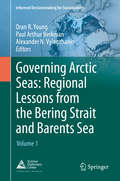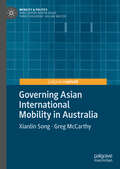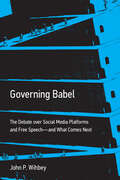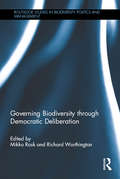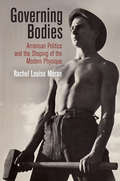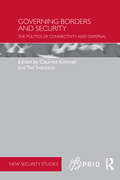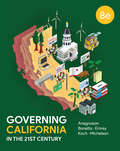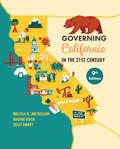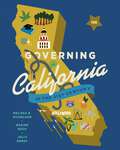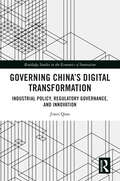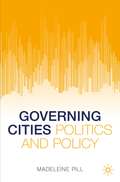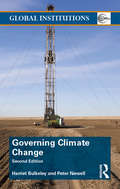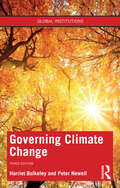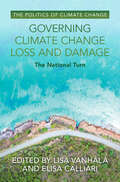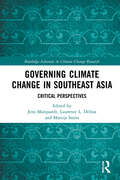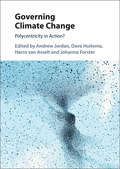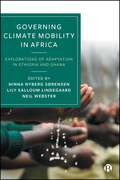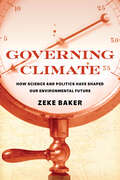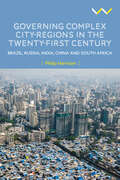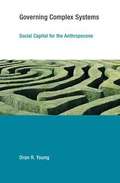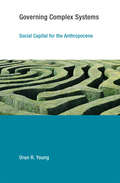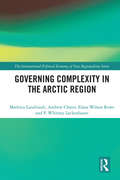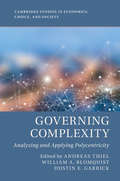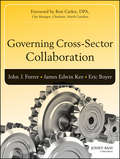- Table View
- List View
Governing Arctic Seas: Volume 1 (Informed Decisionmaking for Sustainability)
by Oran R. Young Paul Arthur Berkman Alexander N. VylegzhaninGoverning Arctic Seas introduces the concept of ecopolitical regions, using in-depth analyses of the Bering Strait and Barents Sea Regions to demonstrate how integrating the natural sciences, social sciences and Indigenous knowledge can reveal patterns, trends and processes as the basis for informed decisionmaking. This book draws on international, interdisciplinary and inclusive (holistic) perspectives to analyze governance mechanisms, built infrastructure and their coupling to achieve sustainability in biophysical regions subject to shared authority. Governing Arctic Seas is the first volume in a series of books on Informed Decisionmaking for Sustainability that apply, train and refine science diplomacy to address transboundary issues at scales ranging from local to global. For nations and peoples as well as those dealing with global concerns, this holistic process operates across a ‘continuum of urgencies’ from security time scales (mitigating risks of political, economic and cultural instabilities that are immediate) to sustainability time scales (balancing economic prosperity, environmental protection and societal well-being across generations). Informed decisionmaking is the apex goal, starting with questions that generate data as stages of research, integrating decisionmaking institutions to employ evidence to reveal options (without advocacy) that contribute to informed decisions. The first volumes in the series focus on the Arctic, revealing legal, economic, environmental and societal lessons with accelerating knowledge co-production to achieve progress with sustainability in this globally-relevant region that is undergoing an environmental state change in the sea and on land. Across all volumes, there is triangulation to integrate research, education and leadership as well as science, technology and innovation to elaborate the theory, methods and skills of informed decisionmaking to build common interests for the benefit of all on Earth.
Governing Asian International Mobility in Australia (Mobility & Politics)
by Xianlin Song Greg McCarthyThis book examines the governance of Asian student and academic mobility, which has transformed the higher education landscape. While campuses are experiencing an unprecedented level of diversity, knowledge creation remains explicitly Eurocentric and dominated by the Global North. The authors advocate for a new educational paradigm that takes into account the transcultural flow of knowledge on campus as a public good, capitalises on Asian students and academics’ multilingual competencies, and offers them equal access to creating quality-orientated education. The book argues that international higher education must be grounded in both a plurality of knowledges and the ethics of cognitive justice, and that the governing policies should facilitate the higher education sector to build a platform of internationalising affect and effect on campus.
Governing Babel: The Debate over Social Media Platforms and Free Speech--and What Comes Next
by John P. WihbeyWhy social media platforms have a responsibility to look after their platforms, how they can achieve the transparency needed, and what they should do when harms arise.The large, corporate global platforms networking the world&’s publics now host most of the world&’s information and communication. Much has been written about social media platforms, and many have argued for platform accountability, responsibility, and transparency. But relatively few works have tried to place platform dynamics and challenges in the context of history, especially with an eye toward sensibly regulating these communications technologies.In Governing Babel, John Wihbey articulates a point of view in the ongoing, high-stakes debate over social media platforms and free speech about how these companies ought to manage their tremendous power.Wihbey takes readers on a journey into the high-pressure and controversial world of social media content moderation, looking at issues through relevant cultural, legal, historical, and global lenses. The book addresses a vast challenge—how to create new rules to deal with the ills of our communications and media systems—but the central argument it develops is relatively simple. The idea is that those who create and manage systems for communications hosting user-generated content have both a responsibility to look after their platforms and have a duty to respond to problems. They must, in effect, adopt a central response principle that allows their platforms to take reasonable action when potential harms present themselves. And finally, they should be judged, and subject to sanction, according to the good faith and persistence of their efforts.
Governing Biodiversity through Democratic Deliberation (Routledge Studies in Biodiversity Politics and Management)
by Mikko Rask Richard WorthingtonThis book discusses political controversies involved in global biodiversity policy, and the practical opportunities that are opened up in solving them through increased citizen participation and democratic deliberation. It examines the emerging practice of deliberative global governance and its political consequences. The collection focuses on the intersection of global biodiversity policy and the promise of deliberative democracy. In doing so, it examines how new discursive logics emerge in global citizen deliberation that might destabilize the impasses encountered in biodiversity negotiations, how a "global citizens’ voice" emerges in deliberative processes despite the dominance of national institutions in the lives of those citizens, the most effective and innovative ways to amplify the results of large-scale deliberations to policy makers and broader audiences, and how future citizen deliberations can be designed to make them fair, feasible and consequential processes, in general and for biodiversity issues in particular. This highly original contribution to the field provides theoretical discussions, empirical analyses and local experiences of biodiversity policy, making it an invaluable resource for students and scholars of environmental politics, governance and sociology, particularly those interested in deliberative democracy, citizen participation and biodiversity.
Governing Bodies: American Politics and the Shaping of the Modern Physique (Politics and Culture in Modern America)
by Rachel Louise MoranAmericans are generally apprehensive about what they perceive as big government—especially when it comes to measures that target their bodies. Soda taxes, trans fat bans, and calorie counts on menus have all proven deeply controversial. Such interventions, Rachel Louise Moran argues, are merely the latest in a long, albeit often quiet, history of policy motivated by economic, military, and familial concerns. In Governing Bodies, Moran traces the tension between the intimate terrain of the individual citizen's body and the public ways in which the federal government has sought to shape the American physique over the course of the twentieth century.Distinguishing her subject from more explicit and aggressive government intrusion into the areas of sexuality and reproduction, Moran offers the concept of the "advisory state"—the use of government research, publicity, and advocacy aimed at achieving citizen support and voluntary participation to realize social goals. Instituted through outside agencies and glossy pamphlets as well as legislation, the advisory state is government out of sight yet intimately present in the lives of citizens. The activities of such groups as the Civilian Conservation Corps, the Children's Bureau, the President's Council on Physical Fitness, and the Special Supplemental Nutrition Program for Women, Infants, and Children (WIC) implement federal body projects in subtle ways that serve to mask governmental interference in personal decisions about diet and exercise. From advice-giving to height-weight standards to mandatory nutrition education, these tactics not only empower and conceal the advisory state but also maintain the illusion of public and private boundaries, even as they become blurred in practice.Weaving together histories of the body, public policy, and social welfare, Moran analyzes a series of discrete episodes to chronicle the federal government's efforts to shape the physique of its citizenry. Governing Bodies sheds light on our present anxieties over the proper boundaries of state power.
Governing Borderless Threats
by Hameiri, Shahar and Jones, Lee Shahar Hameiri Lee Jones'Non-traditional' security problems like pandemic diseases, climate change and terrorism now pervade the global agenda. Many argue that sovereign state-based governance is no longer adequate, demanding and constructing new approaches to manage border-spanning threats. Drawing on critical literature in political science, political geography and political economy, this is the first book that systematically explains the outcomes of these efforts. It shows that transboundary security challenges are primarily governed not through supranational organisations, but by transforming state apparatuses and integrating them into multilevel, regional or global regulatory governance networks. The socio-political contestation shaping this process determines the form, content and operation of transnational security governance regimes. Using three in-depth case studies - environmental degradation, pandemic disease, and transnational crime - this innovative book integrates global governance and international security studies and identifies the political and normative implications of non-traditional security governance, providing insights for scholars and policymakers alike.
Governing Borders and Security: The Politics of Connectivity and Dispersal (PRIO New Security Studies)
by Catarina Kinnvall Ted SvenssonThis book explores and maps the relationship between borders, security and global governance. Theoretically, the book seeks to establish to what degree, and in what ways, traditional notions of borders, security and (global) governance are being eroded, undermined and contested in the context of a globalising world. Borders are increasingly being re-conceptualised to account for connectivity as well as divisions at the same time as focus is shifting from permanence to permeability. The ambivalence ascribed to bordering processes is at heart a security concern; borders are not only entwined with state formation but are also attempts at governing securities, identities and histories. Proceeding from a critical rendering of statist conceptualisations of borders, security and governance, the book not only emphasises the politics of borders, mobility and re-locations, but also provides a shared groundwork for interrogating the spatial conditions for bordering and border work as manifestations of a continuously deferred becoming rather than being. A principal contribution of the volume is its scrutiny of how borders are enacted and perceived in and through the everyday, and of how such production and construal can make sense as acts of resistance to various forms of governing. Such a focus reveals the necessity of investigating how governing from afar affects the possibilities and tendencies to securitise as well as desecuritise, within as well as beyond elite settings. This book will be of much interest to students of border studies, human geography, governmentality, global governance and IR/critical security studies.
Governing California in the Twenty-First Century (Eighth Edition)
by Melissa Michelson Nadine Koch J. Theodore Anagnoson Gerald Bonetto J. Vincent Buck Jolly Emrey James J. KelleherThink critically about California politics. Governing California in the Twenty-First Century introduces students to the major institutions and processes of California state politics, and teaches them to think critically about how they affect their lives. Using contemporary examples and updated data on hot topics—such as the results of the 2020 elections, the environment, and immigration—Governing California shows students the relevance of state government. New co-author Melissa Michelson (Menlo College) expands on the coverage of race and ethnicity and how they intersect with California politics in this thoroughly updated Eighth Edition. This purchase offers access to the digital ebook only.
Governing California in the Twenty-First Century (Ninth Edition)
by Melissa Michelson Nadine Koch Jolly EmreyThink critically about California politics. Governing California in the Twenty-First Century introduces students to the major institutions and processes of California state politics and teaches them to think critically about how these processes affect their lives. Using contemporary examples and updated data on hot topics—such as the 2023 midterm election results, the impact of the recall vote for Governor Gavin Newsom, and the continuing challenges posed by the pandemic and wildfires—Governing California shows students why state government matters. Building on the work of new co-author Melissa Michelson (Menlo College), who has expanded the coverage of race and ethnicity throughout the text, the Ninth Edition features the new California and the Nation section in each chapter, which provides in-depth perspectives on how California’s actions on issues of justice, diversity, and inclusion intersect with politics and compare to actions of the rest of the nation. This purchase offers access to the digital ebook only.
Governing California in the Twenty-First Century (Tenth Edition)
by Melissa Michelson Nadine Koch Jolly EmreyObsessively updated to reflect politics in the Golden State Written and extensively updated by an author team who knows (and is obsessed with) California politics, each chapter presents and analyzes the issues and election results that will shape the state’s future—and students’ lives. “Who Are Californians?” infographics explore these important topics in greater detail, teaching students graphic literacy and critical thinking skills, while California and the Nation boxes highlight key issues on justice, equality, and inclusion. Together with InQuizitive, this book provides students with all the tools they need to master the basics and think critically about California’s past, present, and future. This purchase offers access to the digital ebook only.
Governing China's Digital Transformation: Industrial Policy, Regulatory Governance, and Innovation (Routledge Studies in the Economics of Innovation)
by Jiwei QianThis book examines China’s digital transformation and its complex policy landscape, offering fresh insights into how the world’s second-largest economy navigates the challenges of governing its rapidly evolving digital sector. Through detailed analysis, it reveals the intricate relationship between technological innovation and policy implementation in contemporary China.The book explores critical themes including digital industrial policies, competition policy, data governance, and artificial intelligence development. It introduces two dynamics: the “digital amplification of fragmentation,” which explains how digital technologies intensify existing governance challenges, and the “technology-policy recursive loop,” which describes the interaction between technological advancement and regulatory responses. Using diverse data sources and covering developments such as China’s 2020–2021 regulatory crackdown of major technology firms like Alibaba and Tencent, the book provides a comprehensive examination of China’s unique approach to digital governance. Special attention is paid to pressing issues such as data security, cross-border data flows, and technological self-reliance.An essential read for policymakers, business leaders, and scholars seeking to understand China’s digital economy and its implications for global digital governance. Its accessible analysis offers valuable insights for anyone interested in the intersection of technology, policy, and economic development in contemporary China.
Governing Cities: Politics and Policy
by Madeleine PillIn our urban world, cities are where most of us experience how our economies and societies are organised and the inequalities which result. This textbook introduces ideas, theories, concepts and examples to help us understand the political and policy challenges of governing cities, centred on the principal challenge of how to make our cities more equitable. It poses critical questions – about how cities are governed, by whom, according to what values, and for whom – and draws from a wide range of urban scholarship. The ‘how’ covers urban politics and the policy instruments which result. The ‘by whom’ addresses power relations within and beyond the city and the tensions between different priorities and values. The ‘for whom’ centres equity and the role of citizens and collective action in how we are governed. In addressing these questions, the book provides an overview of the core theories of urban politics and governance, thinks about what happens at different scales, and examines new forms of citizen activism which herald alternatives for cities. It is a unique introduction to students, policymakers and practitioners who want to understand and seek to improve urban politics and policy.
Governing Climate Change (Global Institutions)
by Harriet Bulkeley Peter NewellGoverning Climate Change, Second Edition, provides a short and accessible introduction to how climate change is governed by an increasingly diverse range of actors, from civil society and market actors to multilateral development banks, donors, and cities. This updated edition also includes: up-to-date coverage of the negotiations post-Copenhagen (Cancun, Durban, and towards Paris) and some of the shifts in the inter-governmental politics; a deeper discussion of the roles of actors that have come to prominence in the climate negotiations; an overview of the key funding mechanisms such as the Green Climate Fund, Adaptation Fund, the High-Level Advisory Group on Climate Change Finance, and REDD (Reducing Emissions from Deforestation and forest Degradation); a direct assessment of what the proliferation of TCCG (Transnational Climate Change Governance) adds up to in terms of legitimacy, effectiveness etc., drawing on all the recent research in this area; an analysis of renewable energy in the UK (in the light of recent controversies around the siting of wind turbines and fracking projects). Providing an interdisciplinary perspective drawing on geography, politics, international relations, and development studies, this book is essential reading for students and scholars concerned not only with the climate governance but with the future of the environment in general.
Governing Climate Change (Global Institutions)
by Harriet Bulkeley Peter NewellThis fully revised and expanded new edition provides a short and accessible introduction to how climate change is governed by an increasingly diverse range of actors, from civil society and business actors to multilateral development banks, donors, and cities. The issue of global climate change has risen to the top of the international political agenda. Despite ongoing contestation about the science informing policy, the economic costs of action and the allocation of responsibility for addressing the issue within and between nations, it is clear that climate change will continue to be one of the most pressing and challenging issues facing humanity for many years to come. The book: Evaluates the role of states and non-state actors in governing climate change at multiple levels of political organization: local, national, and global Provides a discussion of theoretical debates on climate change governance, moving beyond analytical approaches focused solely on nation-states and international negotiations Examines a range of key topical issues in the politics of climate change Includes multiple examples from both the north and the global south Providing an inter-disciplinary perspective drawing on geography, politics, international relations, and development studies, this book is essential reading for all those concerned not only with the climate governance but with the future of the environment in general.
Governing Climate Change Loss and Damage: The National Turn (The Politics of Climate Change)
by Lisa Vanhala Elisa CalliariClimate-related loss and damage has been dominating international climate change negotiations in recent years. Until now we have had little understanding of how individual states are grappling with climate change destruction. Governing Climate Change Loss and Damage offers among the first book-length explorations of how loss and damage policy works at a national level. It focuses specifically on countries in the Global South on the frontline of climate change to identify new mechanisms through which key factors – climate risks and impacts, international developments, national institutions and the ideational landscape – shape policy engagement, development and adoption. Guided by an original theoretical framework and seven original empirical case studies, this book shows the way to more effective governance of loss and damage now and in the future. This title is also available as Open Access on Cambridge Core.
Governing Climate Change in Southeast Asia: Critical Perspectives (Routledge Advances in Climate Change Research)
by Jens MarquardtThis volume showcases the diversity of the politics and practices of climate change governance across Southeast Asia. Through a series of country-level case studies and regional perspectives, the authors in this volume explore the complexities and contested nature of climate governance in what can be considered as one of the most dynamic and multi-faceted regions of the world. They reflect upon the tensions between authoritarian and democratic climate change governance, the multiple roles of civil society and non-state interventions, and the conflicts between state planning and market-driven climate change governance. Shedding light on climate change mitigation and adaptation efforts in Southeast Asia, this book presents the various formal and informal institutions of climate change governance, their relevant actors, procedures, and policies. Empirical findings from a diverse set of environments are merged into a cross-country comparison that allows for elaborating on similar patterns whilst at the same time highlighting the distinct features of climate change governance in Southeast Asia. Drawing on case studies from all Southeast Asian countries, namely Brunei Darussalam, Cambodia, Indonesia, Laos, Malaysia, Myanmar, the Philippines, Singapore, Thailand, Timor-Leste, and Viet Nam, this book will be of great interest to students, scholars, and practitioners dealing with climate change and environmental governance.
Governing Climate Change: Polycentricity In Action?
by Andrew Jordan Dave Huitema Van Asselt Harro Johanna ForsterClimate change governance is in a state of enormous flux. New and more dynamic forms of governing are appearing around the international climate regime centred on the United Nations Framework Convention on Climate Change (UNFCCC). They appear to be emerging spontaneously from the bottom up, producing a more dispersed pattern of governing, which Nobel Laureate Elinor Ostrom famously described as 'polycentric'.<P><P> This book brings together contributions from some of the world's foremost experts to provide the first systematic test of the ability of polycentric thinking to explain and enhance societal attempts to govern climate change. It is ideal for researchers in public policy, international relations, environmental science, environmental management, politics, law and public administration. It will also be useful on advanced courses in climate policy and governance, and for practitioners seeking incisive summaries of developments in particular sub-areas and sectors. <P> The first systematic application of polycentric theory in the area of climate change, offering a much more realistic appreciation of the potential and limits of polycentric governing.<P> A novel attempt to comprehend climate governance as a single, evolving system, rather than a series of isolated parts.<P> Draws together fresh insights provided by a diverse team of international experts on the most significant domains and processes of governing.<P> The book, also published as Open Access, is linked to a massive open online course (MOOC) developed by the Open University of the Netherlands, providing a rich set of relevant learning materials for students and early career researchers.
Governing Climate Mobility in Africa: Explorations of Adaptation in Ethiopia and Ghana
by Ninna Nyberg Sørensen, Lily Salloum Lindegaard and Neil WebsterAvailable open access digitally under CC BY NC ND licence. Climate change is often understood as a main driver of human mobility in Africa, but this book demonstrates the many other factors that also come into play in households´ mobility practices including those linked to gender, finance and livelihoods. Using case studies from Ethiopia and Ghana, the edited collection reveals how the two countries’ governance structures play significant roles in shaping households’ agency and mobility options. It shows that mobility has long been practised in both countries and is important for households’ livelihoods and resilience to climate change. The book concludes with policy recommendations for institutional practices that can support adaptive climate mobility.
Governing Climate: How Science and Politics Have Shaped Our Environmental Future
by Zeke BakerAfter decades of debate about global warming, the fact of the climate crisis is finally widely accepted. People at all scales—from the household to the global market—are attempting to govern climate to deal with its causes and impacts. Although the stakes are different now, governing climate is centuries old. In this book, Zeke Baker develops a genealogy of climate science that traces the relationship between those who have created knowledge of the climate and those who have attempted to gain power and govern society, right up to the present, historic moment. Baker draws together over two centuries of science, politics, and environmental change to demonstrate the "co-production" of climate knowledge and power-seeking activity, with a focus on the United States. This book provides a fresh account of contemporary issues transecting science and climate politics, specifically the rise of "climate security," and examines how climate science can either facilitate or reconcile the unequal distribution of power and resources.
Governing Complex City-Regions in the Twenty-First Century: Brazil, Russia, India, China, and South Africa
by Philip HarrisonExplores the challenges of large, complex, institutionally fragmented, and dynamic city-regions across the BRICS countries and the emergence of formal and informal governance arrangements.
Governing Complex Systems: Social Capital for the Anthropocene
by Oran R. YoungThe onset of the Anthropocene, an era in which human actions have become major drivers of change on a planetary scale, has increased the complexity of socioecological systems. Complex systems pose novel challenges for governance because of their high levels of connectivity, nonlinear dynamics, directional patterns of change, and emergent properties. Meeting these challenges will require the development of new intellectual capital. In this book, Oran Young argues that to achieve sustainable outcomes in a world of complex systems, we will need governance systems that are simultaneously durable enough to be effective in guiding behavior and agile enough to adapt to rapidly changing circumstances. While some insights from past research on governance remain valid in this setting, Young argues that we need new social capital to supplement mainstream regulatory approaches that feature rule making with an emphasis on compliance and enforcement. He explores the uses of goal setting as a governance strategy, the idea of principled governance, and the role of what is often called good governance in meeting the challenges of the Anthropocene. Drawing on his long experience operating on the science/policy frontier, Young calls for more effective collaboration between analysts and practitioners in creating and implementing governance systems capable of producing sustainable outcomes in a world of complex systems.
Governing Complex Systems: Social Capital for the Anthropocene (Earth System Governance)
by Oran R. YoungAn exploration of the need for innovative mechanisms of governance in an era when human actions are major drivers of environmental change.The onset of the Anthropocene, an era in which human actions have become major drivers of change on a planetary scale, has increased the complexity of socioecological systems. Complex systems pose novel challenges for governance because of their high levels of connectivity, nonlinear dynamics, directional patterns of change, and emergent properties. Meeting these challenges will require the development of new intellectual capital. In this book, Oran Young argues that to achieve sustainable outcomes in a world of complex systems, we will need governance systems that are simultaneously durable enough to be effective in guiding behavior and agile enough to adapt to rapidly changing circumstances. While some insights from past research on governance remain valid in this setting, Young argues that we need new social capital to supplement mainstream regulatory approaches that feature rule making with an emphasis on compliance and enforcement. He explores the uses of goal setting as a governance strategy, the idea of principled governance, and the role of what is often called good governance in meeting the challenges of the Anthropocene. Drawing on his long experience operating on the science/policy frontier, Young calls for more effective collaboration between analysts and practitioners in creating and implementing governance systems capable of producing sustainable outcomes in a world of complex systems.
Governing Complexity in the Arctic Region (The International Political Economy of New Regionalisms Series)
by P. Whitney Lackenbauer Mathieu Landriault Andrew Chater Elana Wilson RoweThis book examines emerging forms of governance in the Arctic region, exploring how different types of state and non-state actors promote and support rules and standards. The authors argue that confining our understandings of Arctic governance to Arctic states and a focus on the Arctic Council as the primary site of circumpolar governance provides an incomplete picture. Instead, they embrace the complexity of governance in the Arctic by systematically analyzing and comparing the position, interventions, and influence of different actor groups seeking to shape Arctic political and economic outcomes in multiple sites of Arctic politics, both formal and informal.This book assesses the potential that sub-national governments, corporations, civil society organizations, Indigenous peoples and non-Arctic states possess to develop norms and standards to ensure a stable, rule-based Arctic region. It will be of interest to all scholars and students working in the fields of Arctic Sovereignty, Security Studies, Global Governance and International Political Economy.
Governing Complexity: Analyzing and Applying Polycentricity (Cambridge Studies in Economics, Choice, and Society)
by Andreas Thiel William A. Blomquist Dustin E. GarrickThere has been a rapid expansion of academic interest and publications on polycentricity. In the contemporary world, nearly all governance situations are polycentric, but people are not necessarily used to thinking this way. Governing Complexity provides an updated explanation of the concept of polycentric governance. The editors provide examples of it in contemporary settings involving complex natural resource systems, as well as a critical evaluation of the utility of the concept. With contributions from leading scholars in the field, this book makes the case that polycentric governance arrangements exist and it is possible for polycentric arrangements to perform well, persist for long periods, and adapt. Whether they actually function well, persist, or adapt depends on multiple factors that are reviewed and discussed, both theoretically and with examples from actual cases.
Governing Cross-Sector Collaboration
by Eric Boyer John Forrer James Jed KeeA comprehensive guide to public sector collaboration withprivate and nonprofit organizations for better service deliveryGoverning Cross-Sector Collaboration tackles the issuesinherent in partnerships with nongovernmental actors for publicservice delivery, highlighting the choices available and theaccompanying challenges and opportunities that arise. Based onresearch, interviews with public, private and nonprofit sectorleaders, and considerable analysis of organizations involved inpublic-private-nonprofit collaborations, the book provides insightinto cross-sector collaboration at the global, federal, state, andlocal levels. Through an examination of the primary modes ofcross-sector collaboration, including collaborative contracting,partnerships, networks, and independent public services providers,the book presents a clear case for how public managers can assessthe trade-offs and use these options to improve public servicedelivery. Nonprofit organizations, businesses, and third-partycontractors are increasingly partnering with government to deliverpublic services. Recognizing the types of collaborative approaches,and their potential to solve public policy problems is quicklybecoming a major task for public managers, with new methods andtechniques constantly emerging. Governing Cross-SectorCollaboration provides specific examples and a framework forpublic managers to make strategic choices about how to engageprivate and nonprofit actors in delivering public goods andservices while ensuring the public interest. The book provideseffective methods for choosing, designing, governing, andevaluating networks, partnerships, and independent public-servicesproviders, with in-depth discussion encompassing:Analysis and engagement of cross-sector organizationsFostering democratic accountability in the public interestCollaborative approaches (including contracts, networks andpartnerships) and the issues associated with each type ofarrangementLeadership and organizational learning in cross-sectorcollaborationIncluded case studies illustrate effective application of theconcepts and methods described, providing both practicing publicand nonprofit managers and public policy/administration studentswith insight into these emerging strategic alliances. The firstcomprehensive guide to public governance collaborations,Governing Cross-Sector Collaboration is an important andtimely contribution to the field of public management.
